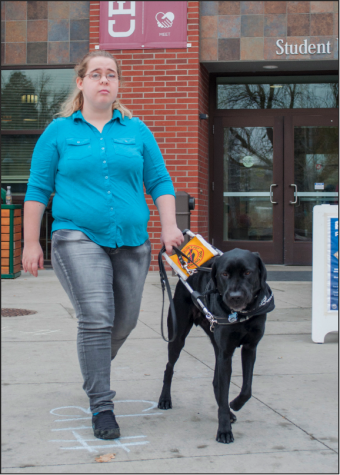Service animals help students in need
December 3, 2014
Some students at Central may require assistance from various animals to go about their day.
According to Josh Jones, disability and accessibility coordinator at Central, there are two categories which animals may fall under: service and comfort animals.

GUIDANCE – Sarah Bair’s service dog helps with her blindness.
According to Richard DeShields, associate dean of student living,, there are around 30 comfort animals currently at Central.
Jones said that service animals are highly trained and utilized to perform specific tasks, such as helping vision impaired students navigate around campus, or even sense oncoming seizures.
There are only two types of recognized animals that can be classified as service animals, dogs and miniature horses.
There are a handful of students who use dogs as service animals.
Students who have service animals are generally free to use their animals throughout campus.
According to Washington law, if somebody has doubts about a service animal, they cannot ask if the person is disabled, and can only ask if the animal is a service animal, and what service it provides.
Service animals are also allowed inside academic spaces.
Jones stressed the importance of other students treating these animals like the workers they are, and not as pets. If students want to interact with service animals, they must ask the owner for permission first.
Students who may be walking their own pets should keep them on leashes so they don’t interfere with service animals.
Comfort animals, on the other hand, are animals which are approved through Central’s disability services center and housing. They are pets which provide some sort of comfort or service for students living in residential halls.
DeShields said that comfort animals must come with a recommendation from a health professional explaining how living with an animal would benefit the student.
Comfort animals may also be able to help those with anxiety and depression.
DeShields said that the most common comfort animals at Central are cats and dogs, but that other animals such as rabbits and turtles are not unheard of.
Generally, according to DeShields, these animals are approved for living spaces. They are allowed to live on the entire floor, not simply confined to an individual room. However, they do come with some extra stipulations.
“Animals approved for fair housing are not approved for academic spaces,” DeShields said.
Service animals, on the other hand, may be approved for academic spaces, such as the SURC or in lecture halls.
In either case, DeShields said it does come with responsibility on the students part.
“The student is responsible for the behavior of their animal,” DeShields said.

